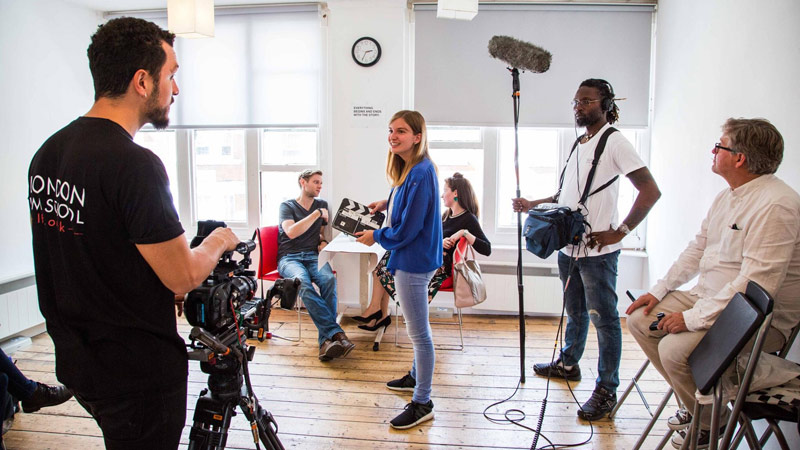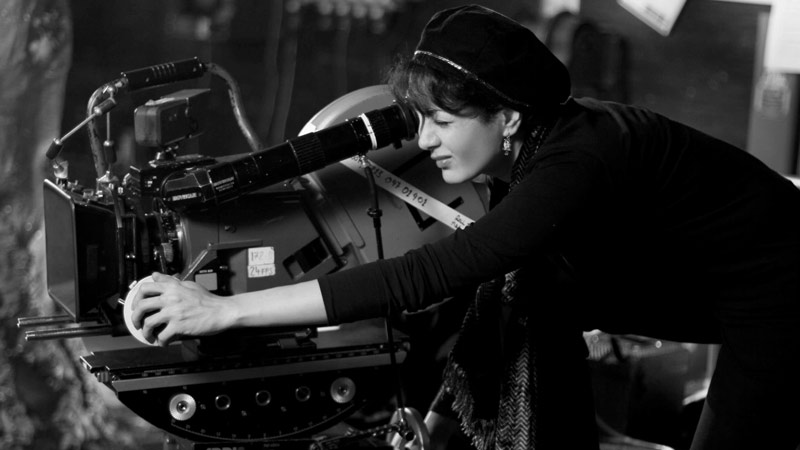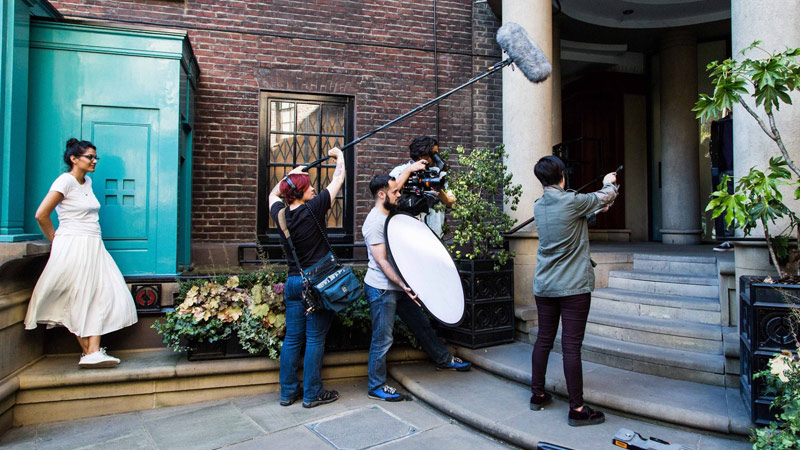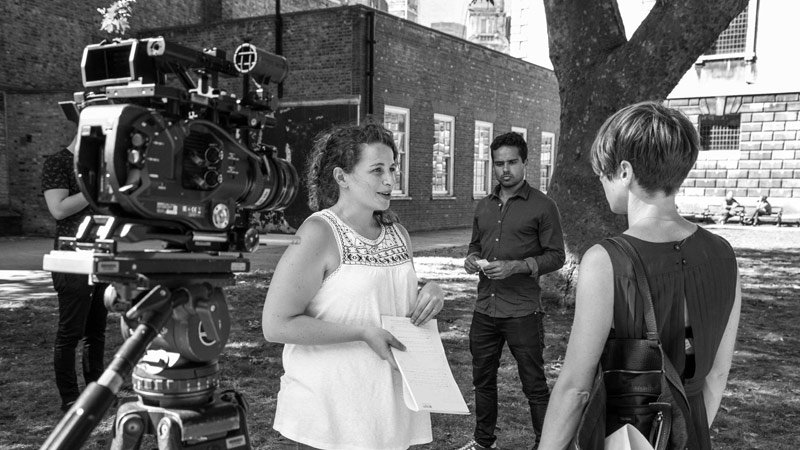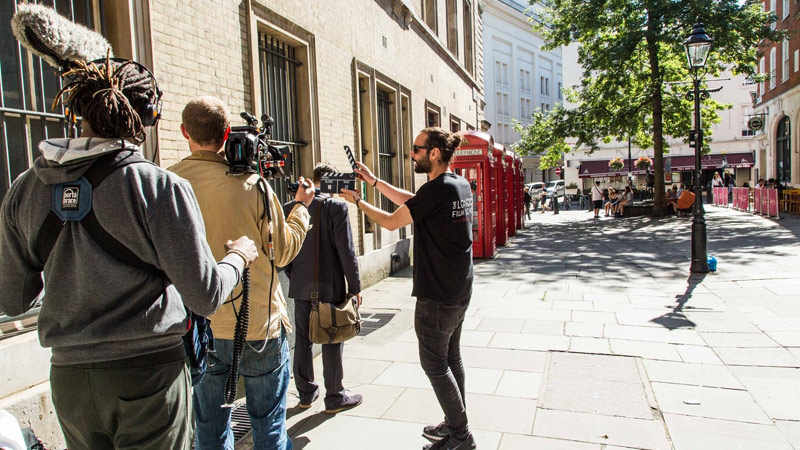Latest Broadcast News
Company:
London Film School
Telephone:
020 78369642
Fax:
020 74973718
Website:
Contact:
Veronique Fricke
Email:
Address
24 Shelton Street,
London,
WC2H 9UB,
England
24 Shelton Street,
London,
WC2H 9UB,
England
About London Film School
London Film School (LFS) is the oldest film school in the UK. For more than 65 years, LFS has been the place for emerging creative talent to hone their craft, find their voice and engage directly with the vibrant UK screen industries. The School offers four full-time MA programmes, a Ph.D. Film by Practice, and a full calendar of short courses.
LFS welcomes a student cohort from every corner of the globe, LFS has always been a cultural hub where fresh voices, experiences and perspectives rub shoulders with tradition and history. A global network, once built, lasts a professional lifetime.
The School is committed to collaborative practice-based learning and produces over 180?films every year, creating a dynamic and intensive film environment. LFS nurture and respect the imagination of students, allowing them to experiment, challenge conventions and explore new modes of storytelling, and to find new ways to connect with audiences.
London Film School is a non-profit educational charity with Greg Dyke as its Chairman of the Board and Chris Auty as its Director.
Facilities
Our London Film School building was previously a warehouse, and has a rough workshop atmosphere which can be exciting, but is not academic and certainly not luxurious. Facilities at LFS include:
Full-Time Study
MA Filmmaking
An intensive two-year course in the heart of London, the MA Filmmaking course trains to a professional level in a full range of filmmaking skills. Students leave with a portfolio of directing, cinematography, editing, production design, producing and sound credits on at least 10 films - usually many more.
MA Screenwriting
This one-year course is aimed at developing screenwriting skills in the context of a filmmaking community where writing is an everyday practice and a collaborative process involving actors, directors, musicians, editors and producers.
MA International Film Business
The MA International Film Business unites London Film School, the world’s key postgraduate filmmaking school, with the University of Exeter’s Film department and Business School. The marriage brings together unique film production and market expertise and exceptional research and teaching on film culture and history. This MA combines high level teaching skills with a unique practitioner-driven industry access program, providing students with the key business tools and contacts needed to build a career in film.
MA Documentary Filmmaking
The two year full time MA Documentary Filmmaking course puts storytelling at its core, with the opportunity for students to experiment and explore their creative ambitions, through in depth learning of professional craft skills and the development of their personal voice. The course will equip students to tell human stories in cinematic ways.
PhD Film by Practice
The University of Exeter College of Humanities is able to offer doctoral studentships to fund doctoral study in Film by Practice, as a joint degree with London Film School. These doctoral studentships are tenable for up to three years and cover full tuition fees and a maintenance allowance.
Workshops
LFS Workshops are a range of evening, weekend and short professional development courses, with the emphasis on a practical, hands-on, intensive learning experience. All courses are developed by leading practitioners and offer an opportunity to study at a professional level, right in the centre of London's Covent Garden.
LFS welcomes a student cohort from every corner of the globe, LFS has always been a cultural hub where fresh voices, experiences and perspectives rub shoulders with tradition and history. A global network, once built, lasts a professional lifetime.
The School is committed to collaborative practice-based learning and produces over 180?films every year, creating a dynamic and intensive film environment. LFS nurture and respect the imagination of students, allowing them to experiment, challenge conventions and explore new modes of storytelling, and to find new ways to connect with audiences.
London Film School is a non-profit educational charity with Greg Dyke as its Chairman of the Board and Chris Auty as its Director.
Facilities
Our London Film School building was previously a warehouse, and has a rough workshop atmosphere which can be exciting, but is not academic and certainly not luxurious. Facilities at LFS include:
- Studios
- Cinemas
- Camera Department
- Design Studio
- Editing Suites
- Sound Suites
- Production Office
- VLE
- Library
- Long Acre Building
- Clubs and Societies
Full-Time Study
MA Filmmaking
An intensive two-year course in the heart of London, the MA Filmmaking course trains to a professional level in a full range of filmmaking skills. Students leave with a portfolio of directing, cinematography, editing, production design, producing and sound credits on at least 10 films - usually many more.
MA Screenwriting
This one-year course is aimed at developing screenwriting skills in the context of a filmmaking community where writing is an everyday practice and a collaborative process involving actors, directors, musicians, editors and producers.
MA International Film Business
The MA International Film Business unites London Film School, the world’s key postgraduate filmmaking school, with the University of Exeter’s Film department and Business School. The marriage brings together unique film production and market expertise and exceptional research and teaching on film culture and history. This MA combines high level teaching skills with a unique practitioner-driven industry access program, providing students with the key business tools and contacts needed to build a career in film.
MA Documentary Filmmaking
The two year full time MA Documentary Filmmaking course puts storytelling at its core, with the opportunity for students to experiment and explore their creative ambitions, through in depth learning of professional craft skills and the development of their personal voice. The course will equip students to tell human stories in cinematic ways.
PhD Film by Practice
The University of Exeter College of Humanities is able to offer doctoral studentships to fund doctoral study in Film by Practice, as a joint degree with London Film School. These doctoral studentships are tenable for up to three years and cover full tuition fees and a maintenance allowance.
Workshops
LFS Workshops are a range of evening, weekend and short professional development courses, with the emphasis on a practical, hands-on, intensive learning experience. All courses are developed by leading practitioners and offer an opportunity to study at a professional level, right in the centre of London's Covent Garden.
Team
| Name | Role | Telephone | |
| Marketing | Marketing Dept | 02078369642 |
Showreel
London Film School In The News
LFS Graduate Wins Silver Bear At Berlinale Film Festival
Rafael Manuel Scooped The Prize For Filipiñana ...
Rafael Manuel Scooped The Prize For Filipiñana ...
Company News
02/08/2022
LFS AND VENICE FILM FESTIVAL
The 79th Venice Film Festival will be taking place from 31st August to 10th September and is one of the highlights of the year for the film and screen industries. We are thrilled that the achievements of our alumni and staff have been recognised.
We’re delighted to share that Living, the film by LFS alumnus, Oliver Hermanus has been selected to be screened non-competitively. The British-set remake of the Akira Kurosawa classic Ikiru, stars Bill Nighy as a 1950s bureaucrat who discovers he is terminally ill, using a script from acclaimed novelist Kazuo Ishiguro. It was an LFS team effort as LFS Honorary Associate, Elizabeth Karlsen, known for Carol (2015) and The Crying Game (1992), also worked on the project as Producer
Living premiered at the 2022 Sundance Film Festival in January and so marks a change in the Venice Film Festival's usual rule that all titles eligible for selection must be world premieres. The film will be showing alongside features by filmmakers including Olivia Wilde in the fiction category. The screening of Living marks Oliver’s return to Venice following his premier of The Endless River in 2015 where he competed for the Golden Lion.
The accolades for LFS alumni continue as Director, Roberto De Paolis who studied at LFS in 2000 will be premiering Princess at Venice Film Festival. Princess is the second feature film by the Roman director and follows a young, illegal Nigerian immigrant who works on the outskirts of a major city. Roberto debuted his work in Cannes’ Directors’ Fortnight in 2017 with his first feature, Pure Hearts, is set to open Venice's Horizons section this year.
We’re also hugely proud too that Hanging Gardens has been recognised in the Horizons Extra category, having been co-produced and co-written by former LFS tutor and Visiting Lecturer, Margaret Glover. The new category of the festival is dedicated to more offbeat works of all genres with no length constraints, focussing on new trends in world cinema.
Screenings of all the Horizons Extra films will be followed by onstage conversations with the directors, writers and actors, moderated by writer and arts journalist Chiara Tagliaferri.
30/05/2022
LFS AT FASTNET FILM FESTIVAL
LFS are delighted that four Grad films screened at this year’s Fastnet Film Festival, an independent festival dedicated to bringing together established and first-time filmmakers. The festival shows competition films in the village hall, pubs, restaurants, shops, galleries and on the sides of buildings, throughout the village of Schull over the last weekend in May. We talked to two LFS grads, Prospero Pensa who made Macchiato and Oscar Albert who made School Ties, about their experiences of filmmaking, the festival circuit and what it was like to study at LFS.
Can you tell us a little about your films?
Prospero Pensa: Macchiato is my graduation film at LFS. It tells the story of an old-fashioned bartender in Milan who must face sudden competition by a new opening bar in the same street. He’s bitter, prejudiced, and badly advised and he’s going to show the worst of himself. I really cared about my film being shot in Milan, the city where I was born and raised and where I’m living back now.
Oscar Albert: School Ties is about two schoolboys, Sid and William, who find a former pupil, and friend, mysteriously living in their makeshift den on the school grounds.
School Ties opens with a declaration of its authenticity - ‘this story is a memory and therefore is true’, but memory creates mystery, and this was an important aspect to pull from the narrative. Sid never finds out why his friend ran away or the reason for his return and when questioned, the adults are evasive. But the backstory is not of interest as much as Sid’s realisation that whatever the reason his friend returned, it wasn’t to "get the gang back together" and Sid knows he will never see him again.
Surrounding the narrative is a British boarding school, itself an institution defined by preserving a narrow worldview that is at odds with a changing world. Sid’s childlike perspective on the events of the film is shaken. He is left uncertain and the world around him feels more fallible than ever.
What’s the reception been like to your films?
PP: The film was generally appreciated by the school and my colleagues, though it started quite slow with festival selections. Having graduated in 2020 screenings that couldn’t be held worldwide, and this disrupted a traditional round of the festivals.
OA: The film's reception has been positive, especially when it comes to craft. It has picked up awards for Fyras Slaiman’s cinematography and Michael Hanes’ sound design. In terms of narrative, people's ‘love it or hate it’ aspect of the story is the decision not to elaborate on the central mystery - Jake's reason for running away. For understandable reasons, some audience members have found this frustrating. Although I have enjoyed seeing people come up with their own reasons and listening to the different scenarios suggested to me in Q&A’s. Leaving so much to the audience's imagination gives the film a life of its own.
What’s the most important thing you learnt at LFS?
PP: The LFS experience is different for everyone, and you don’t necessarily understand what you’re getting out of it in the moment. Two years after my graduation I would say that it really changed my screenwriting game, because that is what I choose to work the most on. If that’s an aspect you want to improve, expect great (and harsh) feedback and learn when to embrace it and when to go your way.
OA: That the hardest part of filmmaking to master is how to construct stories. It’s also the most important aspect to learn.
26/05/2022
LFS MASHA NOVIKOVA AND GLORIOUS REVOLUTION, SOPHIE MCVEIGH, SELECTED FOR CANNESERIES
London Film School graduate Masha Novikova has been awarded joint third prize at La Cinef 2022 for her short film, Glorious Revolution. Set in 2014 at the height of the Ukrainian revolution, the film depicts a mother’s loss, as her son is killed while protesting in Independence Square. Her attempt to bury him as a hero clashes with the corruption in the bureaucratic system, testing her view of Ukraine. We spoke to Masha to find out more about her film and her experiences of studying at London Film School.
Could you explain the story behind Glorious Revolution?
We’ve had lots of revolutions in Ukraine, but they haven’t changed people’s lives for the better. I participated in two. During the Revolution of Dignity 2014, I heard a story about Serhiy Bondarev, who was killed on the first day of protests, and of his mother who struggled to bury him, faced with red tape everywhere. This story touched me because I could have been in Serhiy’s place.
How have your experiences of the 2014 Revolution inspired the film and impacted on the stories you want to tell?
The Revolution of Dignity greatly influenced the self-consciousness of people, including me, it showed the possibility and the way of fight. This idea is embodied in my film through the character of a mother who has lost everything, her son, shelter, and income, but she continues her fight. It is stubborn and strong, it is the prototype of modern Ukraine, I feel it in myself because I am also waging my own personal struggle.
What’s the reception been like to the film and how has the festival circuit gone?
While there have been no festival screenings yet, I showed the film to my parents, and my grandmother who cried at watching it.
Current events have brought the struggles in Ukraine to light once more although Glorious Revolution was made before the current conflict. Are more aware of how difficult life in Ukraine must be?
In 2014, people fought the same forces inside Ukraine with which they are now waging war from outside. Only then it was a war with Russian agents inside the country, and now it is an attack directly by Russia itself. Undoubtedly, against the backdrop of current events, the understanding of the situation in Ukraine has become more understandable for people around the world. The plot of the film has become closer and clearer to the audience.
Your background has had a lot of influence on the kind of stories you want to tell, but did you find that the people you met at LFS also had an impact on how you tell them?
I am very grateful to my teachers Richard Kwietniowski and Rafael Kapelinski from whom I learned a lot. Communication with people at the LFS of different nationalities led me to the understanding that the stories I tell should be universally understandable to most people in the world.
Did you work with other LFS students on Glorious Revolution, and how and when was completed?
The film was completely shot by LFS graduates and students with the great support of the Ukrainian crew. The postproduction of the film was completed in July 2021. The film was shot in Kyiv and around Kyiv.
What’s the most important thing you learnt at LFS?
To fight. LFS taught me what my film is about, struggle.
What’s next, do you have any more projects lined up?
I had the honour to develop my upcoming short film “Maria’s Lovers” with Hungarian director, Ildikó Enyedi, who has given me a great deal of advice and guidance. The film is going to be an autobiographical tragicomedy.
Find London Film School in
Location of London Film School
Training Sponsors

- Avid Media Composer
- QC and Post Workflow
- File based techniologies
- Advanced Files & Compression
- IT for post, Broadcast & Post QC

Award Winning Cameraman
- Documentary
- Wildlife
- Underwater
- Aerials
- Sound Sync
- Presenter led Programming
- Science & Features

The London Film School remains one of only a few remaining independent creative specialist conservatoires in the world. We continue working hard to remain a leading centre for film education.











